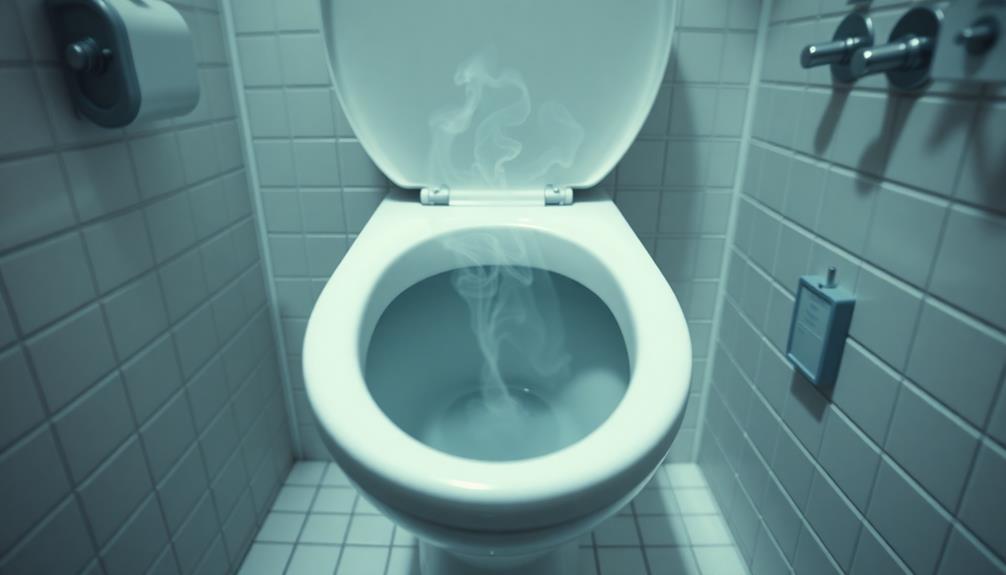During menopause, you might notice your body odor changes due to hormonal shifts, particularly decreased estrogen. This can result in scents that are often described as pungent, musty, or even metallic. Increased sweating, especially during hot flashes, leads to more apocrine sweat, which has fats and proteins that bacteria break down, creating various smells. You could smell onion-like or even sweet at times. Stress and diet can also affect this. Remember, if you find the changes concerning, a chat with a healthcare provider can help. Stick around, and you might discover more helpful tips!
Key Takeaways
- Menopause body odor can be pungent, often resembling musty, sour, or ammonia-like scents due to hormonal changes.
- Increased apocrine sweat may produce sweet or onion-like smells, particularly during hot flashes or night sweats.
- Odor intensity and type can vary significantly among individuals, influenced by stress, diet, and hydration levels.
- Some women report odors similar to urine or metallic scents, especially during periods of high stress or heat.
- Open discussions about these changes can help reduce stigma and support women experiencing menopause-related body odor.
Introduction

Menopause can bring about several unexpected changes, one of which is body odor. As your estrogen levels drop during this menopausal transition, you might notice that your body scent becomes stronger or different. This change often happens due to hormonal fluctuations that affect the way your body produces sweat, especially from the apocrine sweat glands.
You may experience increased sweating, particularly during hot flashes and night sweats, which can make body odor more noticeable. The sweat produced during menopause can break down differently, and when mixed with bacteria on your skin, it can create a variety of scents. Some women describe these odors as musky or even reminiscent of urine.
Additionally, stress factors and lifestyle choices, like diet, can influence your overall body scent. The intensity of your body odor can change, as increased testosterone levels relative to estrogen can also play a role.
Understanding these changes can help you navigate this new phase of life. By being aware of what's happening, you can take steps to manage your body odor and feel more comfortable during this time.
Description of the Smell

During this transitional phase, many women notice that their body odor can become notably stronger and more complex. You might find that your menopause body odor resembles a pungent scent, perhaps even a bit like urine. This change stems from hormonal fluctuations, particularly the decline in estrogen levels.
As your body undergoes changes in sweat composition, you may notice an increase in apocrine sweat production, which can lead to a sweet or onion-like smell. The odor can become more pronounced, especially during hot flashes or stressful moments, resulting in a muskier scent.
Additionally, the bacteria on your skin play a significant role in how your body odor evolves. They thrive on the altered sweat, breaking it down and intensifying the smell.
It's important to remember that the intensity and type of body odor during menopause can vary widely. Just as everyone's fingerprints are unique, so are your hormonal differences.
Embrace this time as you learn about your body and its changes. With understanding and a few adjustments, you can navigate these shifts with confidence!
Source and Composition

As hormonal changes occur, the source of menopause body odor primarily stems from apocrine sweat, which contains fats and proteins.
During the menopausal transition, the decline in estrogen and fluctuations in hormones can change the composition of sweat. This often leads to a stronger, sometimes musky or ammonia-like body odor.
When apocrine sweat breaks down, bacteria help create odors that can resemble sweet, onion-like scents due to thioalcohols.
Additionally, stress and anxiety, common during menopause, can increase the production of apocrine sweat, giving bacteria more nutrients to work with and potentially intensifying body odor.
Dehydration can also play a role, especially during hot flashes.
When you're dehydrated, your sweat becomes more concentrated, making the odors more noticeable.
Understanding these factors can help you manage menopause body odor more effectively.
Typical Scenarios or Environments

Hormonal fluctuations can lead to noticeable changes in body odor, which often become more pronounced in specific scenarios or environments. During menopause, many women report stronger scents that can resemble urine or have a musky quality. This is especially true during hot flashes and night sweats, which affect 75%-80% of women.
When you're sweating more, bacteria on your skin mix with sweat, intensifying that body odor. Some environments, like crowded places or hot weather, can make these odors even more noticeable. This prompts many to wonder what causes sweat to smell in the first place. Sweat itself is actually odorless; however, when it interacts with bacteria on the skin, it breaks down into substances that produce that characteristic odor. Additionally, consuming certain foods or wearing non-breathable clothing can exacerbate these smells.
Stress and anxiety, common during menopause, can also play a role. They change your sweat composition, causing thicker sweat that can carry a stronger scent.
Your diet matters too! Eating spicy foods, alcohol, or caffeine can increase the intensity of body odor. So, if you're heading to a festive gathering or an important event, consider adjusting your meals beforehand.
Keeping an eye on how these factors interact can help you feel more confident and pleasant in social situations. Remember, you're not alone in this; many women face similar challenges during menopause, and understanding these changes can help you manage them better.
Emotional or Cultural Associations

Menopause's impact on body odor can stir up complex emotions and cultural perceptions. Many women experience emotional responses like embarrassment or anxiety when dealing with menopause body odor. Society often links unpleasant scents to poor hygiene, which can make you feel self-conscious.
However, it's essential to remember that cultural perceptions vary. In some cultures, a stronger scent may signify maturity or vitality, while in others, it can be stigmatized.
The changes in body odor may also affect your body image and confidence. You might feel a sense of loss for your pre-menopausal self, which can heighten psychological impacts like mood swings and self-esteem issues. These feelings are more common than you think!
Creating open discussions about menopause-related body odor helps normalize the experience. By talking about it, you help reduce stigma and encourage a supportive community.
Surrounding yourself with friends or loved ones who understand can make a big difference. Embracing these changes together can foster confidence and ease embarrassment.
Health or Safety Considerations

Changes in body odor during menopause can be a significant concern for many women, impacting both health and safety. As you experience hormonal fluctuations, like increased testosterone, your body odor might become stronger or muskier. It's essential to pay attention to these changes.
If you notice persistent or unusual body odors, it could signal underlying health issues, such as infections or metabolic disorders. Consulting a healthcare professional can help you understand what's going on.
Strong, fishy, or rotten odors may indicate infections that require medical attention. Remember, dehydration, often worsened by hot flashes, can concentrate your sweat, making odors more intense. Staying hydrated is crucial for managing body odor during menopause.
While some odor changes are normal, any sudden or severe shifts should prompt a discussion with your healthcare provider. They can help rule out serious conditions and ensure you're on the right track.
Final Thoughts

As you navigate through menopause, it's important to recognize that body odor can be one of many changes you're experiencing. The menopause body goes through various transformations due to hormonal fluctuations.
You might notice your body odor changes in intensity, sometimes smelling stronger or even urine-like. This can happen because your apocrine glands produce more sweat, which bacteria break down into stronger scents.
Hot flashes and increased sweating can also contribute to this issue. If you're feeling stressed or anxious, those emotions can lead to even more protein-rich sweat.
Remember, everyone's body is unique, so your personal hormonal changes, diet, and overall health will influence your odor.
To manage these changes, consider adjusting your diet and staying hydrated. Regular exercise can help balance your hormones and improve your mood, making it easier to cope with stress levels.
Don't hesitate to talk to your doctor if you're concerned about noticeable body odor changes. Embrace this new phase of life with confidence, knowing that you're not alone in this journey.
With a little care, you can navigate menopause comfortably and maintain your well-being!
Frequently Asked Questions
What Is Menopause Body Odor?
Menopause body odor refers to the changes in scent you might notice due to hormonal shifts. These fluctuations can lead to stronger odors, often described as muskier, influenced by sweat composition and bacterial activity.
What Does Thyroid Sweat Smell Like?
Thyroid sweat can smell sweet or fruity, often due to elevated ketones. If you have a thyroid disorder, you might notice changes in odor intensity based on your diet and hydration levels.
How Do I Get Rid of Feminine Odor During Menopause?
To reduce feminine odor during menopause, maintain good hygiene, stay hydrated, adjust your diet, and consider using stronger antiperspirants. Hormone Replacement Therapy can also help balance hormones, minimizing odor-related issues. You'll feel fresher!
Why Is My Bo so Bad All of a Sudden?
Your body odor might seem worse suddenly due to hormonal changes, increased sweat production, or stress. Consider reviewing your diet and managing stress levels while maintaining good hygiene to help alleviate the issue.









